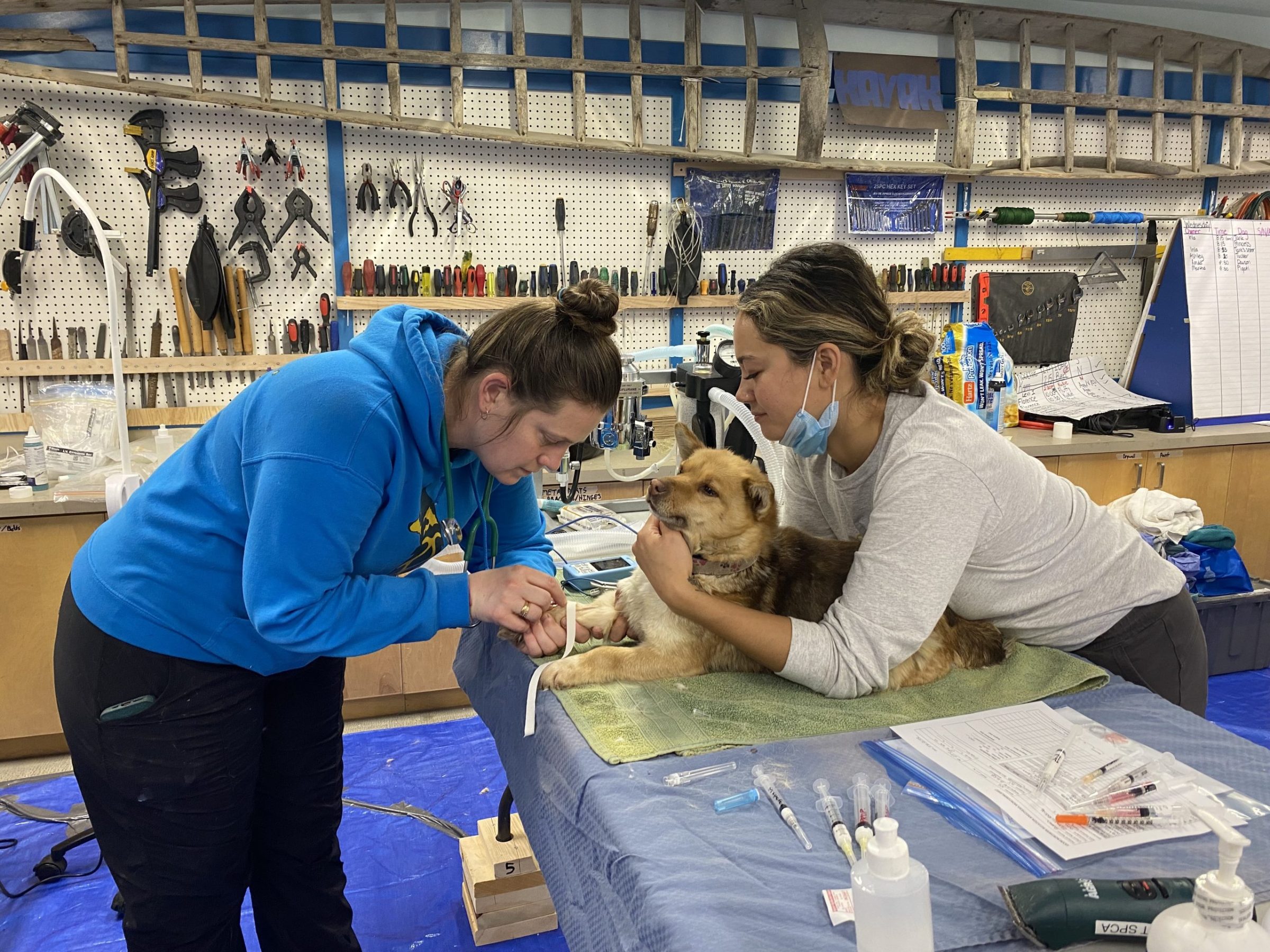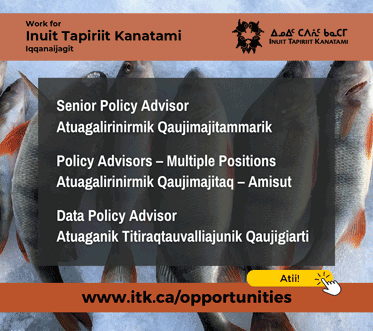Teacher fundraising for vet to visit Igloolik before Nunavut Quest
Pet owner said getting a vet to community for first time in 5 years will be important
Queen, a Kimmirut dog, gets an intravenous catheter prior to being spayed by vet technologist Wendy Kane (left) and Dr. Michelle Tuma in Qaqqalik School’s shop. Tuma and Kane were part of Veterinarians Without Borders, an organization that partnered with the hamlet to offer free services in Kimmirut in March 2022. (Photo courtesy of Marieke Van Der Velden)
An Igloolik teacher is raising money for Veterinarians Without Borders to visit the community for the first time in five years.
Bailey Waldner, who has lived in Igloolik for four years and has two dogs of her own, hopes to raise $15,000 to bring the volunteer-run animal care provider to the community.
And she hopes to have it done before the start of Nunavut Quest this spring.
“All the dogs that are going to be coming here from other communities — it’s a good thing to have our dogs’ vaccinations updated, and whatever else.”
Nunavut Quest, an annual 400-kilometre dogsled race with roughly a dozen dog teams from Arctic Bay to Igloolik, takes place in April each year.
The $15,000 Waldner is seeking to raise will go toward bringing the organization into the community in early March. Of that, $7,500 will be to cover the cost of travel with the remaining $7,500 used for housing and supply needs for veterinarians while they’re in the community.
She said bringing a vet to Igloolik will also help residents who need to update vaccinations for their pets.
Waldner was able to administer vaccines for her own dogs but they aren’t considered valid, especially when she travels down south, because they haven’t been given by a licensed veterinarian.
“When Veterinarians Without Borders comes up, [my dog will] be able to have all of those shots again and they’ll have a record of it — they’ll have a paper trail.”
Marieke Van Der Velden, northern program manager for Veterinarians Without Borders, said the organization currently works with six Nunavut communities on an annual basis, including Kimmirut and Gjoa Haven.
The team of veterinarians who visit the communities each year provides services such as vaccinations, spaying and neutering,
As a predominantly volunteer-run organization, Van Der Velden said its trips north usually involve the community raising funds for the cost of travel and accommodation, while the organization covers the cost of vaccinations and other services offered on the ground.
She said a highlight of bringing Veterinarians Without Borders to Nunavut is the many ways in which each community raises funds for such a service.
“What’s really amazing [is that] some communities do bingos or work with local businesses to get donations,” Van Der Velden said.
“There’s a real entrepreneurial spirit to community members that helps to make this happen.”
At the same time, the need to fly veterinarians into communities shows the consistent problem of — and significant need for — better animal care services within Nunavut.
“[It’s] being able to provide these services and also work to build capacity within the community with people who are interested in growing their skills and being able to provide more [services] year-round,” she said.







Perhaps our city council could be trying to reach out to vets without borders to organize a visit to iqaluit
Bingos in Nunavut are the greatest thing ever. You could be raising money for a new mine or to ban hunting and people would still buy cards.
Be sure to tell them to bring a whole lot of parvo/distemper shots. Years ago it spread through many of the teams and we didn’t have so many puppies that year. We started ordering them from a vet in Yellowknife and was shipped to the health center (because they have to stay refrigerated). Then the nurse just supplied us with enough syringes and we gave it to the dogs ourselves. In the fat of the neck, pretty easy. Also, the health centers should have vials of rabies in stock for free with 10 shots per vile for dogs in the communities (even if expired). Anyone wanting to get a jump start and get rabies shot over with should ask, they should be free. Sometimes we would bring the dogs into the garage at the health center and the nurse would help us. Hardest part is keeping the syringes from freezing. On the ice they would be pre-filled and in our jackets, or we would bring the dogs in the porch one at a time. I think it was about $160 for a case of maybe 50 parvo/distemper doses, paid by visa and arrived in 3 days. Health centers probably have the paper certificates that can be written up for the dogs as a reminder of who got what. The sticker labels on the parvo/distemper shots peels of and we would stick it to the paper certificut. For rabies we just wrote the lot# and date on the paper. Easy Peasy 🙂
For parvo and distemper, one makes the dogs act kind of nuts like rabies and I had no help for them, the other gets discharge from the eyes and nose, they dont eat or drink, and waste away. If caught early amoxil and constant water and food offering saves them. It spreads in their poop so they would have to be separated for a few weeks and kept clean. Hope all this helps and happy races!!!!!